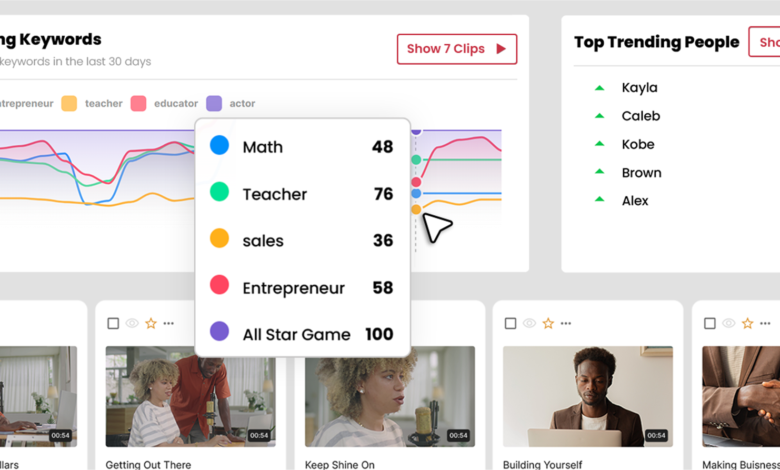
By Oren Kandel, CEO and Co-founder of Munch.
Amid the rise of social media as a critical business tool, the demand for captivating video content is at an all-time high. But audio-visual content creation is not as easy as influencers and creators may make it look – particularly when it comes to editing: an often tedious process requiring dense workflows and complex software tools.
Fortunately, a new generation of video editing technology has emerged, promising to redefine workflows, optimize resources, and make content creation even more simple and accessible. Leading the charge is Munch, a cutting-edge video editing platform that harnesses artificial intelligence to seamlessly convert lengthy videos into captivating bite-sized clips, tailor-made for effortless social media sharing.
The Evolution of Video Editing Tools
Once a specialized skill reserved for trained professionals with access to top-tier software and equipment, video editing has since been reoriented to appeal to consumer markets and fulfill simpler use cases.
The introduction of user-friendly editing software such as iMovie and Windows Movie Maker was a pivotal moment for digital content creation, as it simplified and democratized basic video editing tasks for an amateur user base. These systems, however, were only capable of delivering a limited range of editing capabilities. Higher-quality, professional videos still demanded a considerable depth of technical expertise and thus remained predominately out of reach for amateur creators.
But as the demand for video content surged in recent years, advanced and easy-to-use video editing solutions catering to both content marketers and creators have become more of a necessity.
What Sets These Tools Apart?
The latest video editing tools distinguish themselves from previous generations in several key areas, the first being their convenient user-facing interfaces. These tools prioritize intuitive interfaces – drag-and-drop functionality, self-explanatory navigation, and other up-to-date features that reflect the needs of average users. No matter the extent of any one person’s video editing experience, interfaces are designed to reduce the learning curve and increase productivity among content marketers and creators.
Another advantage is their cloud-based architecture, enabling real-time collaboration among team members, regardless of where they are physically. This means teams can forgo tedious back-and-forth file transfers and email chains and instead work together seamlessly on a single platform.
Automation and AI-powered features have also enhanced the video editing landscape. These tools provide capabilities such as automatic video trimming, scene recognition, and even voice and face recognition. AI-driven tools can even act as a video-editing assistant, suggesting relevant music, transitions, and captions based on the specific content. Not only do these additions expedite the editing process, but they also imbue tools with a heightened level of intelligence.
The latest suite of tools also bolsters video editing thanks to their ever-growing asset libraries – stock footage, music tracks, graphics, and so on. New generations of video editing tools often include extensive built-in libraries, providing users with frictionless access to a wealth of high-quality resources without necessitating internet goose chases or extra costs.
Finally, this generation of editing tools is defined by its compatibility with mobile devices, including smartphones and tablets. This ensures that content marketers and creators can capture, edit, and publish videos “on the go,” streamlining workflow and increasing overall efficiency.
Munch: A Game-Changer for Social Media
Among the array of next-generation video editing tools, Munch stands out as a transformative solution fine-tuned for content marketers and creators in the social media arena.
Munch leverages AI to repurpose long-form videos into engaging, bite-sized clips primed for social media sharing. Its innovative platform also streamlines the resource-intensive process of video editing and trend research, which caters to the high-demand frequency of social media publishing and the need to regularly promote brand awareness.
What’s more, Munch’s AI can generate precise subtitles instantly – a key expectation amongst viewers that helps engage a wider audience.
Munch’s platform also offers pre-scripted social media posts, allowing users to avoid the time-consuming guesswork of crafting compelling captions and content descriptions.
The Value Reel
What kind of value does Munch’s suite of video editing tools bring to users?
First is time savings. With Munch, editing tasks that would normally take hours or days take a fraction of the time. Coupled with cloud-based collaboration environments, this means quicker turnaround times for video content creation, keeping audiences engaged and content fresh.
Compared to expensive traditional video editing software, Munch is far more cost-efficient. Munch offers subscription-based pricing models to reduce upfront costs and give users the ability to scale-up content production without breaking the bank.
Beyond the logistical benefits, Munch’s AI-powered features inspire creativity. Utilizing tools that suggest transitions, music, captions, and content descriptions, content marketers and creators are encouraged to explore new creative choices when brainstorming ideas for content.
A Strategic Investment
When choosing a video editing tool, content marketers and creators should consider the interface and features that align best with their content and which are compatible with their existing software and hardware equipment, pricing structures, and available customer support resources.
Munch has all that covered.
With their user-friendly interfaces, cloud-based collaboration, automation, and AI-powered features, these tools are not just convenient; they’re a strategic investment.


